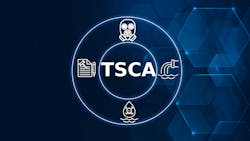SOCMA, ACC Applaud New Focus on TSCA Reform
The Society of Chemical Manufacturers & Affiliates (SOCMA) recently commended Congress for its focus on strengthening the new chemicals review process under the Toxic Substances Control Act (TSCA). A streamlined and efficient review process is critical to fostering innovation, enabling the development of new chemicals, and maintaining America’s leadership in specialty chemical manufacturing, said SOCMA in a press statement.
“Nearly 10 years after the passage of the Frank R. Lautenberg Chemical Safety for the 21st Century Act, the Environmental Protection Agency (EPA) has implemented the law’s requirements in a manner that runs counter to congressional intent,” said Congressmen and committee chairs Brett Guthrie and Morgan Griffith. “During this hearing, the Subcommittee on Environment will get to the root of those policies that have inhibited American innovation and our ability to compete in the global market. The new administration offers a chance to address these issues and ensure American leadership in safely producing the chemicals vital to manufacturing in the years ahead.”
Jennifer Abril, president and CEO of SOCMA, said the hearing underscores the critical need to modernize the TSCA new chemicals review process and … unlock innovation and bolster manufacturing. “We welcome the opportunity to work alongside the new administration and Congress to address longstanding challenges and create a pathway that positions the United States as a global leader in safely advancing chemical technologies. By seizing this moment, we can strengthen the industry’s role in driving economic growth and innovation.”
SOCMA said it will continue to work with policymakers “to ensure the TSCA framework supports both environmental safety and the continued innovation that drives our industry forward.”
In similar fashion, American Chemistry Council’s (ACC) President and CEO, Chris Jahn called on lawmakers to support practical science-based policy improvements to the nation’s primary chemical management law as he delivered testimony before the U.S. House Energy and Commerce Subcommittee on the Environment.
“Like any other user fee program, Congress [can] assess whether improvements are necessary. Delays and the lack of using sound science are jeopardizing chemical manufacturing here in the United States,” Jahn said in a press statement. “We have a unique opportunity to reform our regulatory environment to help U.S. manufacturing and allow us to outcompete other countries for years to come.”
When Congress passed the Lautenberg Act amendments in 2016, it included a 10-year review provision requiring Congress to reauthorize the EPA's authority to assess fees by September 2026. This provision specifically requires Congress to enact a new authorization of EPA’s authority to assess fees and authorize any technical corrections to improve TSCA implementation.
Jahn explained how the EPA’s unrealistic approach to existing chemical reviews has led to the unwarranted overregulation of critical chemistries and a heightened risk of offshoring products and materials essential to national security, infrastructure and healthcare.
Jahn concluded his testimony by asking Congress to consider several recommendations to get TSCA working including:
- A 90-day shot-clock for new chemicals reviews: EPA should implement a shot-clock counting down the number of days it takes the Agency’s to complete new chemical reviews. The shot-clock should include an enforcement mechanism when EPA misses the 90-day deadline to review new chemicals coming to the market.
- Use the best available science when assessing existing chemicals in commerce: Regulations for existing chemicals need to be risk-based and appropriately scoped, must rely on the best available science and weight-of-scientific evidence and recognize the use of personal protective equipment (PPE) when evaluating workplace exposure.
About the Author
Amanda Joshi
Managing Editor
Amanda Joshi has more than 18 years of experience in business-to-business publishing for both print and digital content. Before joining Chemical Processing, she worked with Manufacturing.net and Electrical Contracting Products. She’s a versatile, award-winning editor with experience in writing and editing technical content, executing marketing strategy, developing new products, attending industry events and developing customer relationships.
Amanda graduated from Northern Illinois University in 2001 with a B.A. in English and has been an English teacher. She lives in the Chicago suburbs with her husband and daughter, and their mini Aussiedoodle, Riley. In her rare spare time, she enjoys reading, tackling DIY projects, and horseback riding.

